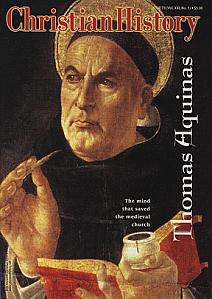Pure Albertus Magnus Was Known as "The Universal Doctor"
ALBERT THE GREAT has been compared to the biblical patriarch Isaac. His parents, like Isaac’s parents Abraham and Sarah, were elderly and had been childless until he was born, around 1193, in the German province of Bavaria. It was a tumultuous time in history. The Crusades were at their height, the Inquisition in its infancy, lost works of Aristotle being recovered, universities on the rise, the papacy at its most powerful, and the orders of the preaching friars (Franciscans and Dominicans) gaining strength. Albert’s parents gave him a good education, which meant much study of the Greek and Roman classics in Latin and such science as was then known. Germany had no universities, so he traveled to Padua in modern Italy to further his education.
Padua offered many opportunities for debauchery, but Albert stayed true to his faith and its virtues by means of regular religious exercises. Because of his breadth of knowledge, he became known as the “sage” or “master of philosophers.” He joined the Dominicans in 1223 and his superiors sent him to Bologna to study theology, where he learned the Bible and mastered the teachings of the church fathers. At the end of his religious training, they ordered him to Cologne as a teacher and preacher. As the Dominicans opened new schools throughout Germany, they sent Albert to help establish and organize them. Everywhere he went, he preached. A student noted that he recited from the Psalms each day and wrote prayers.
In 1245 Albert was back in Cologne. There his fame as “universal doctor” attracted his most famous pupil to him—Thomas Aquinas. Aquinas would one day overshadow his teacher in theology and logic, but Albert was always the better scientist. The common folk suspected Albertus of magic and invented a legend that he made a man entirely of brass which acted as his servant and could speak, answering any question put to it. Tired of its continual chatter, however, Aquinas destroyed it with his walking stick. In actuality, the two had the highest respect for each other, and Albertus defended Aquinas’s philosophy after the younger man’s premature death.
Albertus wrote many books. He especially shone in biology, classifying plants and describing the stages of animal growth. However, his most lasting book has been On Adhering to God, in which he asked: “Of what profit is the highest profession of religion, or a seeming holy conversation, without living in the spirit of Truth and humility, wherein Christ dwells, through faith wrought and formed by love? Wherefore we are told that the kingdom of God is within us: which is no other than Jesus Christ himself.”
He was made bishop of Ratisbon, a position he gave up in 1262 to return to Cologne. It was in Cologne, on this day, 15 November 1280, that the mind of one of the great thinkers was stilled. His last words were a quotation from the Psalms: “We shall behold in the city of God what we have heard.”
—Dan Graves
----- ----- -----
For more on Albert the Great, see "Thomas Aquinas: A Gallery of Scholastic Superstars" in Christian History #73, Thomas Aquinas
Other Events on this Day
- KING MWANGA KILLED MUKASA FOR MAKING CHRISTIANS
- God Saved Dixon's Eyes, His LIFE, and His Soul
- The Lord Baited Carroll’s Hook With Promise Of REST






